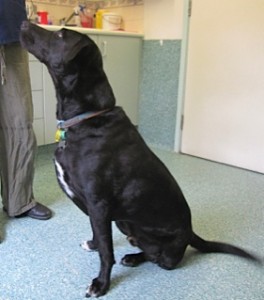
Fun-loving Teddy is a regular visitor to Hall Vet Surgery. He is a much-loved member and protector of a young family, as gentle as he is outgoing.
At age three Teddy started limping on one of his hind legs. At first his owners thought he’d hurt himself on one of his wild runs around the lake. We prescribed rest and pain relief and thought he’d soon get over it, but he got lamer and lamer.
Perhaps he had ruptured a ligament in his knee, a common injury in busy dogs. We anaesthetised him and manipulated it. The instability we associate with cruciate ligament damage was missing so we took X-rays of the whole leg.
The X-rays confused even the specialists. A lesion in his long bone could have been a bone infection or bone cancer. A biopsy of the bone confirmed the worst – Teddy had osteosarcoma, an aggressive bone cancer.
By this time Teddy was withdrawing into himself and spending a lot of his time trying to rest. Pain relief medication helped a little but it was obvious that the cancer was causing him much pain.
To alleviate the pain and prevent further spread his owners decided we should amputate his leg. Teddy’s relief was immediate. He bounced home next morning as if he’d been made to run on three legs.
However we knew that the osteosarcoma had probably already spread to his lymph nodes and lungs. Although we could not see any metastases in his lung X-rays, we knew they were probably there. Without further treatment Teddy had only 6 weeks of life left.
The veterinary oncologist suggested a chemotherapy regime that would extend his life expectancy. His family did not want to do anything that would make him feel unwell. We reassured them that chemo for pets is designed to ensure that they have a good quality of life. Doses are tailored to suit the patient and reduced if they affect blood cell production or cause nausea, vomiting or diarrhoea.
Teddy came in weekly for his chemotherapy. Although he had a few days off his food in the 12 weeks, he came into the Surgery with a wag in his tail every single time, delighted to see us and clearly enjoying life.
So far we have detected no recurrence of the cancer at his monthly rechecks. His family is delighted with his response to the treatment – and so are his fans at Hall Vet Surgery.

